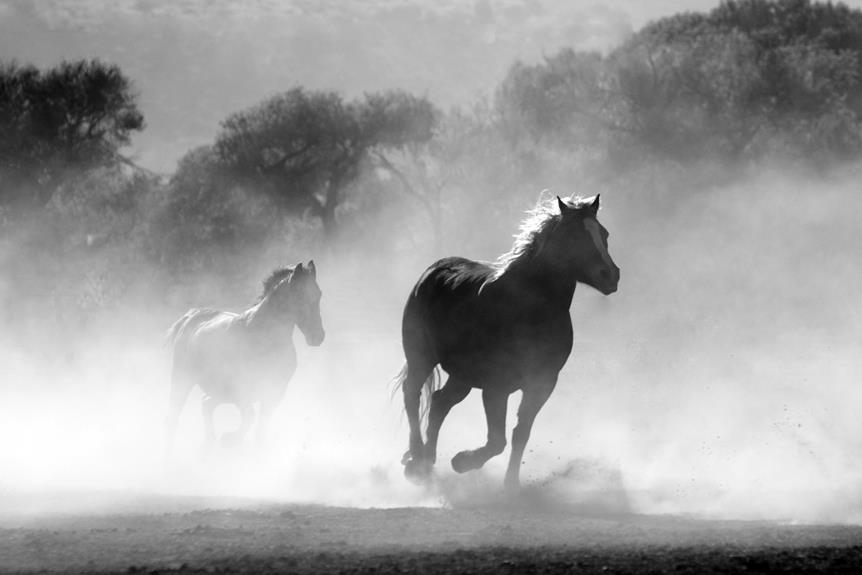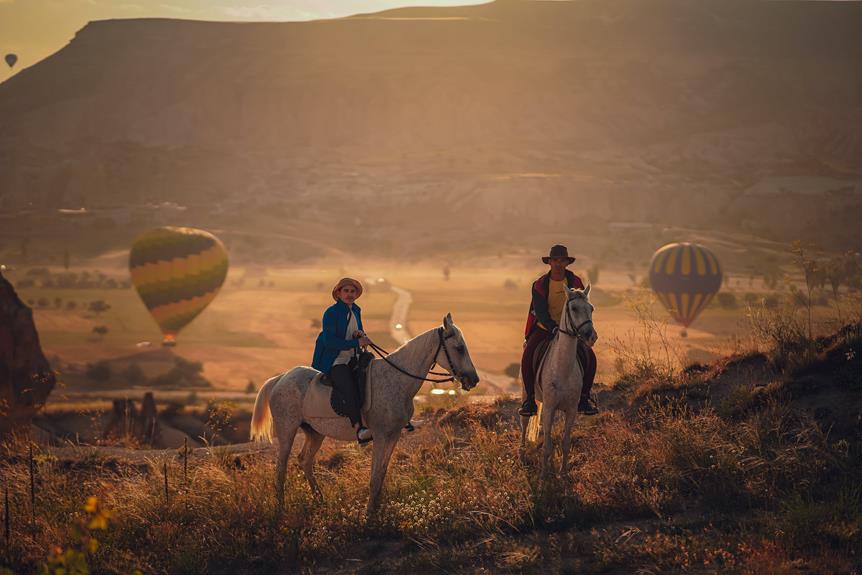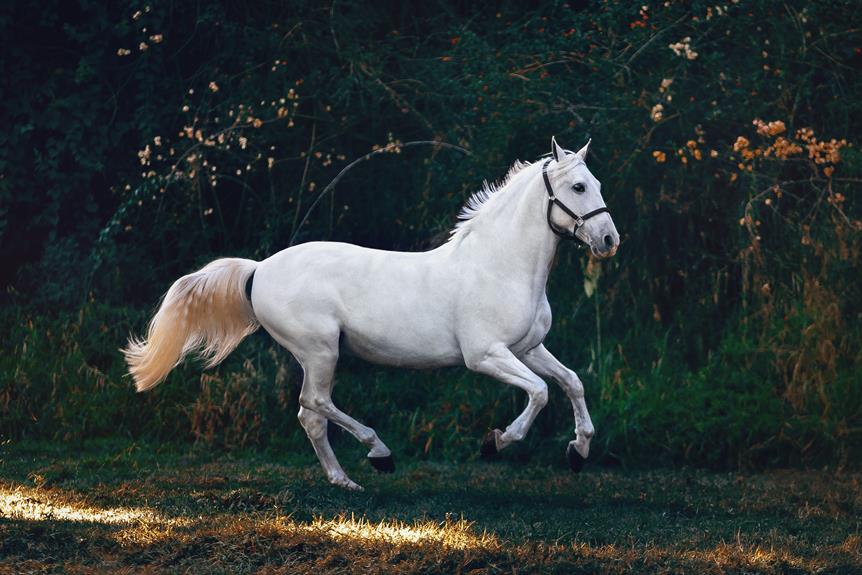Are you curious about the top speed a horse can reach? Well, hold onto your hat, because the answer might surprise you.
The speed at which a horse can gallop depends on several factors, such as breed, training, and individual capability. While the average domestic horse can reach speeds of around 30 mph, trained horses can push the limits and achieve speeds of 40 mph or more.
But what about those speed demons known as thoroughbred racehorses? Stay tuned to find out just how fast they can go and what factors can influence a horse's top speed.
Key Takeaways
- Genetics, training, nutrition, and track conditions all play a significant role in a horse's top speed.
- Thoroughbred racehorses are specifically bred and trained for speed and can reach speeds upwards of 50 mph.
- Wild mustangs have impressive top speeds of up to 54 mph, influenced by terrain and fitness level.
- Domesticated horses can reach speeds of around 30 mph on average, with trained horses achieving speeds of 40 mph or more.
Fastest Recorded Horse Speed
The fastest recorded horse speed is a remarkable feat, reaching speeds upwards of 50 mph for thoroughbred racehorses. These horses are bred and trained specifically for speed, and their ability to run at such incredible speeds is truly awe-inspiring. While the average running speed of a domestic horse is around 30 mph, these highly trained athletes can reach even greater velocities.
Different horse breeds have different top speeds, with thoroughbred racehorses being known for their exceptional speed. These horses are built for speed, with long legs and a lean body that allows them to cover ground quickly. With the right training and conditioning, they can achieve incredible bursts of speed, making them the fastest horses on record.
It's important to note that a horse's speed can be influenced by various factors. Work and training play a significant role in a horse's performance, as do factors such as genetics, rider weight, and track conditions. Horses are generally slower with a rider, averaging speeds between 32 to 48.5 km per hour.
While records for wild horse speed aren't as common, the top speed ever recorded for a wild horse is an astonishing 54 mph. This demonstrates that even without human intervention, horses are capable of running at incredible speeds.
Top Speed of Racehorses
Racehorses are known for their impressive top speeds, reaching velocities of 40 mph or more. When it comes to horse racing, speed is a crucial factor. Thoroughbreds, in particular, are renowned for their exceptional speed, with some reaching upwards of 50 mph. However, it's important to note that the average top speed of a racehorse can vary depending on factors such as breed, training, and surface conditions.
At the Penn National Race Course in Pennsylvania, a Thoroughbred named Winning Brew set the record for the fastest speed ever recorded in an official race. On May 14, 2008, Winning Brew blazed past the finish line at a breathtaking speed of 43.97 mph, validating the incredible capabilities of these magnificent animals. While this record stands as a testament to the exceptional speed of Thoroughbreds, it's worth mentioning that American Quarter Horses hold the title for the fastest horse breed. With a top speed of 55 mph, they excel in short-distance races, showcasing their explosive bursts of speed.
It is important to remember that horse racing isn't solely about speed. Different races require horses to run varying distances, and endurance is just as crucial as raw speed. Nevertheless, the quest to find the fastest horse continues to captivate enthusiasts and fuel the excitement surrounding this thrilling sport.
Maximum Speed of Wild Mustangs
When it comes to discussing the maximum speed of wild mustangs, it's fascinating to explore the natural athleticism and high-speed running capabilities of these magnificent creatures. While their top speeds may not rival those of the fastest recorded racehorses, wild mustangs can reach impressive speeds of up to 54 mph. This showcases their exceptional agility and speed, which are crucial traits for their survival in the wild. Despite being smaller and less powerful than the average horse, mustangs have evolved to have remarkable speed, comparable to popular horse breeds like Thoroughbreds and Quarter Horses.
The maximum speed of wild mustangs can vary depending on various factors. Terrain plays a significant role in determining how fast these horses can run. Mustangs are known for their ability to navigate rough and uneven landscapes, allowing them to reach their maximum speeds even in challenging environments. Additionally, a horse's fitness level and individual capabilities also influence their top speed. A well-conditioned and healthy mustang is more likely to reach higher speeds compared to one that's unfit or injured.
The respiratory system of a wild mustang also plays a crucial role in determining their maximum speed. A horse's respiratory system enables them to take in oxygen during intense exercise, allowing their muscles to function optimally. A healthy and efficient respiratory system allows mustangs to maintain high speeds for extended periods, further highlighting their natural athleticism.
Understanding the maximum speed of wild mustangs is essential for appreciating their natural abilities and the role that speed plays in their survival and behavior. Whether it's escaping predators or covering vast distances in search of food and water, the wild mustang's speed is a testament to their adaptability and resilience in the wild.
Speed Capabilities of Domesticated Horses
To truly understand the speed capabilities of domesticated horses, it's important to recognize the varying factors that can influence their running speeds. How fast can a horse actually go? Well, it depends on several factors.
Firstly, different breeds have different top speeds, with Quarter Horses and Thoroughbreds being the fastest. On average, a domestic horse can reach speeds of around 30 mph, while trained horses can achieve speeds of 40 mph or more. Thoroughbred racehorses, with their intense training and conditioning, can even reach speeds upwards of 50 mph.
But what about the distance a horse can travel at these fast speeds? In general, the average speed of an equine gallop is approximately 27 mph. This means that a horse can cover a considerable distance in a short amount of time. A horse's gait, or the way it moves its legs, plays a significant role in its speed. The number of strides per minute and the stride angle influence how fast a horse can run.
It's fascinating to note that the fastest recorded speed for a racehorse is a staggering 55 mph. However, this exceptional speed isn't something that every horse can achieve. Factors such as genetics, training, nutrition, racing surface quality, and jockey skills all contribute to a horse's speed capabilities. So, while some horses may be able to reach incredible speeds, others may not be as fast.
Factors Influencing a Horse's Top Speed
Now let's explore the various factors that influence a horse's top speed.
Genetics: A horse's genetic makeup plays a significant role in determining its speed potential. Different breeds have varying levels of natural speed, with racehorse breeds being bred specifically for their speed capabilities. However, it's important to note that within each breed, individual variations in genetics can still exist, leading to horses with different speed capabilities.
Training: Training and conditioning are crucial in enhancing a horse's speed and improving its overall performance. Through structured workouts and exercises, horses can develop their muscles, improve their cardiovascular fitness, and increase their stamina, allowing them to reach their full speed potential.
Nutrition: Proper nutrition and diet are essential for a horse's overall health and fitness, which in turn influences its speed. A well-balanced diet that provides the necessary nutrients and energy can help a horse perform at its best and reach its top speed.
Racing Surface Quality: The quality of the racing surface, such as track conditions, can greatly impact a horse's speed. Factors like the firmness or softness of the ground, the presence of sand or grass, and the level of moisture can affect how well a horse can grip the surface and propel itself forward at full speed.
Jockey Skills: The rider on a horse's back, known as the jockey, plays a vital role in determining the horse's speed during a race. Jockeys with excellent riding skills and race strategy can effectively manage a horse's speed throughout the race, making timely decisions that optimize the horse's performance.
Frequently Asked Questions
What Is the Top Speed of Horse?
You might be wondering, "What's the top speed of a horse?" Well, trained horses can reach speeds of 40 mph or more, with Thoroughbred racehorses hitting upwards of 50 mph. Impressive, right?
What Is the Top Speed of a Horse Race?
The top speed of a horse race can vary depending on various factors. Factors such as training methods, genetics, track conditions, and the influence of jockeys can all impact a horse's speed.
Is 20 Mph Fast for a Horse?
Yes, 20 mph is fast for a horse. Some horse breeds can reach speeds of 40 mph or more. Factors like genetics, training, racing surface, and jockeys can all affect a horse's speed.
Can Horses Run 30 Mph?
Yes, horses can run 30 mph. Factors such as genetics, training, and nutrition contribute to a horse's speed. Famous racing horses like Secretariat reached speeds exceeding 50 mph. Jockeys play a crucial role in horse racing, and health and diet are essential for high-speed horses.
Conclusion
So there you have it – the top speed for a horse can vary depending on various factors such as breed, training, and individual capability.
On average, domestic horses can reach speeds of around 30 mph, while trained horses can achieve speeds of 40 mph or more. Thoroughbred racehorses are known for their exceptional speed, reaching upwards of 50 mph.
However, a horse's speed can be influenced by factors like work, training, and overall health.



0 Comments